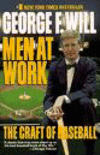-Tony La Russa
A favorite anesthesia blogger, T of Anesthesioboist, recently
compared anesthesia to cooking. Not an inapt comparison, but I've
always thought anesthesia was most like...baseball. There are the
obvious reasons (I'm a guy, I was a baseball fan, baseball is like all
of life..); no, wait-hear me out on this one.
Anesthesia is like playing right field.
Firstly, batting is like an anesthesia induction or emergence (or like coming off bypass); it is an acutely intense activity which requires complete concentration on multiple rapidly changing variables in the midst of distraction, if one is to be successful. It is an intensely physical activity (go ahead-try to manage a cardiac induction with a broken finger or sprained ankle) with relatively narrow tolerances. Hitting and anesthesia are completely honest activities; there is no pretend, and little that is relative; either you got it right or you didn't.
The maintenance phase of anesthesia is like playing right field; although it looks relaxed, it's anything but; peering in for signals as to positioning, scrutinizing the batter's stance for clues to his intentions. Examining the baserunner's positions; who's fast enough to tag up and beat a throw, who's slow. Ignoring or engaging the crowd. Preparing to move to a hit ball...every pitch is an exercise in focused watchfulness and pre-positioning. That's the price of playing in the big leagues. And being a "gold glover" means virtually never committing an error; One mistake in a thousand plays is barely good enough. The chances that any given pitch will result in the need for decisive action by the right fielder are low; maybe routine fly balls two or three times a game. Once every five or ten games maybe a big move; shag a fly and a long accurate throw to the cutoff man. Once or twice a season, the game hinges on your move; hero or goat? And if you get it right, the pitcher might come by in the locker room and thank you for saving the game; or, more likely, he might be too busy talking to the press about "his" win.
Underlying this comparison is a concept; "keeping your head in the game." Outfielders understand it well. It's a hot day. It's lonely. The pitcher is knocking'em down pretty good. You're on an extended road trip and you're tired, etc. etc. This is when the gold glover shows what sets him apart from others. This part of anesthesia is not cognitive; it is emotional. And, it is learned. I have spoken before of the tension and fatigue of young trainees in their first months, which I believe is the result of emotional stress and OVER-vigilance. Over-vigilance is like gripping the steering wheel or golf club too tight; fatigue is inevitable. Vigilance must be modulated, just like every other clinical intervention, if we are to give good care long-term.
Success is in the details.
"In Baseball you take nothing for granted. You look after all the little details, or suddenly this game will kick you right in the butt." Jim Lefebvre in "Men at Work"
Winning in baseball is a matter of accumulating advantages by
inches. A winning season is made up of countless little acts done
right; a signal, the right pitch, backing up the play at first base, correct
infield positioning. A pre-game pep-talk is worthless if the infield
can't handle the intricacies of a bunt down the third baseline with a
runner on first. (Which is handled differently than the same bunt with
a runner on second, or with no outs instead of one out; but, never mind
that...). And, how often is there a bunt down the third baseline? I'll
bet not 10 times per season per team. But this is practiced many
HUNDREDS of times in training. Of course, this sounds just like the OR,
and just like anesthesia. We all have moves (awake flexible fiberoptic
intubation? paramedian spinal approach?) that we've perfected but
hardly ever need, these are "inches" we bring out when the situation
arises.
Everybody on the team, surgical or baseball accumulates "inches" of advantage for the club. The groundskeepers of a big-league ball club cut the infield grass differently depending upon the particular strengths of the opposing team and their own team's situation. (If your first baseman has a groin pull, you might leave the grass longer along the first base side, for instance, to give him an extra moment to get to a grounder.) Same with the OR; don't sterilize or count right, game lost...
How do YOU tape your ET tube for a prone craniotomy?
 Making Informed Choices
Making Informed Choices
In the most excellent baseball book ever, "Men at Work" by George Will, Tony LaRussa, the attorney-Oakland athletic manager (at the time), discussed the eight offensive plays that can be executed with a man on 1st and 3rd. Not nine, not seven. Which, if any, play the manager calls depends upon the tactical situation, manager preference, time of day, direction of the wind (?) This is exactly analogous to anesthesia. There are clinical situations where we must choose from among a list of tactics in order to advance care. We usually don't consider all the possible approaches we can take to a particular situation before choosing one. That would take too long and leads to a certain type of incompetence we see in some hyper-intellectual insecure sorts of anesthesiologists. We trust our instincts - just like Tony Larussa-to make A right choice. How do we know if we made a right choice - it worked. (Good judgment comes from experience, experience comes from bad judgments - Will Rodgers)
The OR and the diamond are sacred spaces.
Twenty years ago, a new Comiskey park (home of the White Sox) was being built. I went to a game at the new park as they were tearing down the old. As I walked down the street, I could see through a gap in the demolished wall into the old diamond-the gap was like a wound; it was jarring to see the pristine grass and red dirt from the street. And interestingly, the wall was down, but the field was still beautiful; the altar goes last..
The OR is like a big league ball field. Secular sacred ground. A stage, a set, where there are different rules of human behavior and interaction (don't touch anything blue or green...) Just like a player, we learn to leave our personal concerns and worries outside the OR; if we don't, our game suffers, and the spiritual mood of the OR is impacted. After thirty years, normally, changing into scrubs is when I prepare my mindset for the day, although if I have personal turmoil I'll come in a little early and have a cup of coffee in the lounge. If it's a really bad day, I'll go set up my OR for a while... One of my fellow blog authors used to call it "putting on his game face." I understood what he meant. I think a lot of surgeons and anesthesiologists take emotional refuge in the rituals of the OR when things aren't going so well outside; I know I do...
They're both part business
There are business aspects of maintaining a practice. Surgery touches on the sacred for us and the patients. Just so, the game of baseball is like a sacrament to those involved. Nevertheless, the ball club managers must see to the need to maintain relationships in their community, and must balance the books to stay in business. We owe a sacred duty to our patients, but we have a secondary duty to "keep our customers satisfied;" those customers being surgeons, primary doctors, OR staffs, administrators, and like-it-or-not, payers. It all makes for interesting, sometimes exhilarating, sometimes depressing days.
BUT...
One way in which what we do is different from baseball, is that, in the end, if the right fielder "drops the ball," nobody dies...
 Mitch Keamy is an anesthesiologist in Las Vegas Nevada
Mitch Keamy is an anesthesiologist in Las Vegas Nevada
 Andy Kofke is a Professor of Neuro-anesthesiology and Critical Care at the University of Pennslvania
Andy Kofke is a Professor of Neuro-anesthesiology and Critical Care at the University of Pennslvania
 Mike O'Connor is Professor of Anesthesiology and Critical Care at the University of Chicago
Mike O'Connor is Professor of Anesthesiology and Critical Care at the University of Chicago
 Rob Dean is a cardiac anesthesiologist in Grand Rapids Michigan, with extensive experience in O.R. administration.
Rob Dean is a cardiac anesthesiologist in Grand Rapids Michigan, with extensive experience in O.R. administration.

Men at Work - Not even close.
Off the top of my head, How Life Imitates the World Series by Boswell, Five Seasons by Angell and The Boys of Summer by Kahn. Both of the Autobiographies of Earl Weaver and Whitey Herzog are better (they are better managers than LaRussa, also) and I'm sure five or six more will come to mind.
That's not to say you didn't make good points but as baseball books go, Will is not as good as those guys and his over the top love of LaRussa doesn't help.
Posted by: Cory | August 07, 2024 at 02:55 PM
Thanks for the mention!
Being a total ignoramus about a sport which I know is SACRED, especially here in Boston, I gotta thank you for a terrific eye-opener about both baseball and our daily art/science. I especially loved your right field metaphor. Gotta get me to Fenway Park one of these days after an education like this! :)
Posted by: T. | August 07, 2024 at 03:25 PM